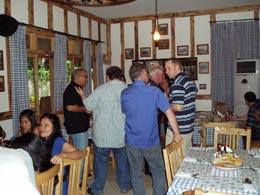Why expats love Southeast Asia

The Philippines and other Southeast Asian peers are rated highly by expats looking outside their homeland for career satisfaction, based on a new survey commissioned by British banking giant HSBC.
HSBC’s Expat Explorer survey, now in its eighth year, showed that two-thirds of expats in the Philippines were integrating well with the local community.
The Philippines ranks 28th in the overall Expat Explorer league table that consists of 39 countries ranked based on their attractiveness using various metrics such as opportunities in disposable income, wages, savings, economic confidence, entrepreneurship, politics, career progression, work/life balance, job security, quality of life, culture, health, making friends, integration, safety, finance, healthcare, property and closeness with partner, school quality and childcare quality.
The survey among 21,950 expats was meant to be a guide for people who are not sure where they want to move, are still deciding between a few countries and want to compare their home country with other countries in detail.
The survey showed that hunting for a higher quality of life beats better jobs prospects as top reason for moving abroad.
Singapore was rated as the top all-round destination for expats, followed by New Zealand, Sweden, Bahrain, Germany, Canada, Australia, Taiwan, United Arab Emirates and Switzerland.
Expats hail the opportunities for career development, appealing salaries and an excellent quality of life in Singapore.
Elsewhere in Southeast Asia, the countries on the list of favored expat destinations are Malaysia (20th), Thailand (21st), Vietnam (25th) and the Philippines (28th).
Asia’s biggest economy China, which is now experiencing a growth slowdown and asset market rout, ranks 27th or a notch above the Philippines.
Majority of expats living in the Philippines (57 percent), Malaysia (55 percent), Indonesia (54 percent) and mainland China (53 percent) all say they have found their work to be more fulfilling since relocating, compared with less than 15 percent in these countries who say the opposite. One reason for this is how expats find it easy to fit in with their local colleagues, with around two thirds of expats in the Philippines (65 percent) and Indonesia (62 percent) saying they are integrating well with the local community.
The Philippines was cited as one of the good destinations for expats to instantly feel “at home” along with Bahrain and Spain. The length of time it takes to settle into a new life abroad is relatively short for expats, though the reasons why differ.
For almost half (48 percent) of expats, it takes less than a year for their adopted country to feel like home. For 16 percent of expats, the change is instant.
The importance of making new friends was seen as a key part of feeling at home with more than half (51 percent) of expats saying this is the most important milestone for them. As well as making friends, 38 percent of expats globally say understanding the local culture is essential to settling in.
The survey also showed that a social circle is not the only focus for expat partners. Many who join their partners overseas look to build their own career or take on a new challenge. Almost two in five (39 percent) say the chance to acquire new skills is better than in their host country, compared to 26 percent who disagree. In addition, 22 percent say the move abroad was partly about a new personal challenge for them.
Expat partners also see the benefits to their relationship of moving overseas. Of those who moved abroad to support their partner, more than half (54 percent) say this change has brought them closer together in their relationship, compared to just 13 percent who say this is not the case.
Expat partners moving to India, Philippines and Mexico in particular enjoy a closer relationship, with 65 percent, 63 percent and 61 percent in these countries saying they feel closer to their partner since moving.
Gigi Pio de Roda, head of HSBC Philippines’ retail banking wealth management, commented: “Expats migrate to other countries to further their career progression, expand their current knowledge and skill-set as well as boost network connections that could pave the way for a booming future. This involves making complex decisions in managing finances, integrating into the local culture, building a family and saving for retirement. Philippines ranks 9th in the family league table, where an expat’s relationships, education, childcare, impact of raising and integrating children abroad, are reviewed. Indeed, an expat in the Philippines can feel much at ‘home’ where they integrate well with the locals whose warmth and hospitality come naturally. When expats go home or leave the Philippines for another assignment, they have already gained Filipino friends for life.”






